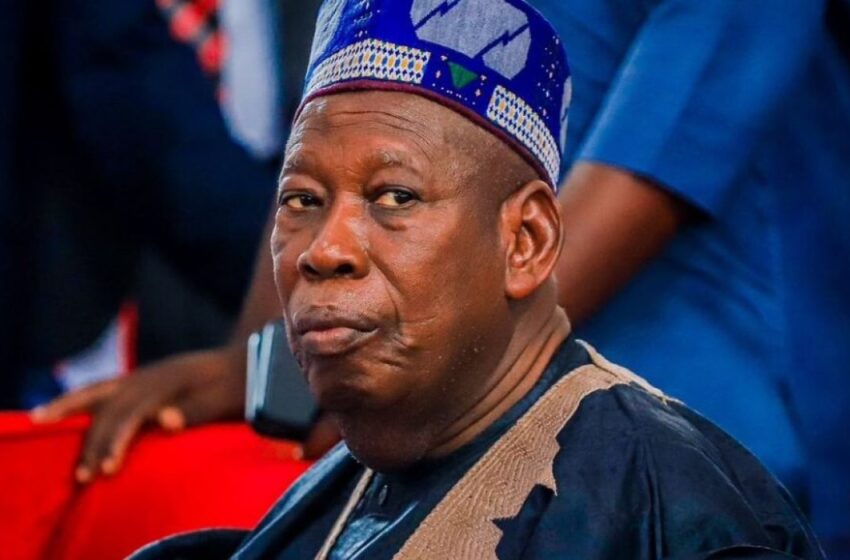Ganduje at FAAN: Political reward or meritocratic choice?

Abdullahi Ganduje named FAAN board chair
The recent appointment of former Kano State Governor and former National Chairman of the All Progressive Congress (APC), Dr. Abdullahi Umar Ganduje, as Chairman of the Board of the Federal Airports Authority of Nigeria (FAAN) has ignited national discourse. While some hail it as a move toward strengthening aviation governance, others view it as a classic case of political compensation within Nigeria’s power structure.
Keyamo Unveils Ganduje as FAAN Board Chair
On Tuesday, July 9, 2025, Minister of Aviation and Aerospace Development, Festus Keyamo, officially introduced Ganduje as the new FAAN board chairman during a high-level meeting in Abuja. According to Keyamo, the appointment aligns with the administration’s aim to reposition the aviation sector through experienced leadership and strategic oversight.
Ganduje, who completed two terms as governor of Kano State and previously served as deputy governor, brings decades of political experience to the role. Keyamo emphasized that the FAAN board now represents a mix of “seasoned administrators, technocrats, and statesmen” expected to work collaboratively toward improving Nigeria’s airport infrastructure and services.
Political Consideration or Strategic Leadership?
The announcement, however, has sparked intense public debate over the merit of Ganduje’s appointment. Critics argue that the former governor’s record in aviation or transport administration is limited, suggesting that the move reflects political loyalty more than sectoral expertise. Ganduje played a key role in the All Progressives Congress (APC)’s 2023 electoral strategies, and his new position may be interpreted as a reward for loyalty.
Supporters of the appointment disagree. They highlight Ganduje’s track record in public administration, infrastructure projects, and policy formulation in Kano State as transferable competencies. His defenders argue that the FAAN board chairmanship requires administrative acumen more than technical aviation background, skills they believe Ganduje possesses.
What This Means for the Aviation Sector
Ganduje’s appointment comes at a time when the Nigerian aviation industry faces growing pressure to improve service delivery, expand infrastructure, and enhance safety standards across domestic and international airports. The Federal Government has prioritised upgrades at Lagos, Abuja, Port Harcourt, and Kano airports, alongside long-term plans for airport yielding and private sector partnerships.
As FAAN board chairman, Ganduje will play a pivotal role in shaping these policies, facilitating stakeholder engagement, and providing oversight on operational reforms. His political weight may also help unlock intergovernmental support, secure funding, and align the aviation sector’s goals with the national economic agenda. However, critics warn that poor performance or lack of technocratic insight could stall progress.
READ MORE
Ganduje resigns as APC national chairman: Health reasons or strategic retreat?
Ganduje, Audu Ogbeh, other top Nigerian party leaders who resigned
Mixed Reactions from Industry Experts
Industry watchers have responded with caution. Some aviation professionals believe that while the board chair does not need to be an aviation expert, the role should be filled by someone with at least baseline knowledge or a demonstrated interest in transport systems. Others argue that Ganduje’s administrative network may be valuable for coordinating policy execution across ministries.
Still, skeptics fear that politically motivated appointments could dilute the gains made in the sector over the past decade, particularly if strategic leadership is not prioritised. They urge the Ministry to ensure that Ganduje’s leadership is complemented by capable technocrats in executive roles, particularly the Managing Director and Director of Operations positions.
Political Reward or Meritocratic Choice
Ganduje’s emergence as FAAN board chairman is a high-stakes decision with implications beyond politics. Whether this turns out to be a bold move for aviation reform or another example of Nigeria’s patronage politics will depend on how effectively the board executes its mandate. For now, Nigerians and industry stakeholders are watching closely.
His appointment not only raises questions about the balance between political rewards and technical expertise in public appointments but also underscores the need for accountability, performance tracking, and results-driven leadership in all sectors, especially aviation, where safety and service delivery are critical.

